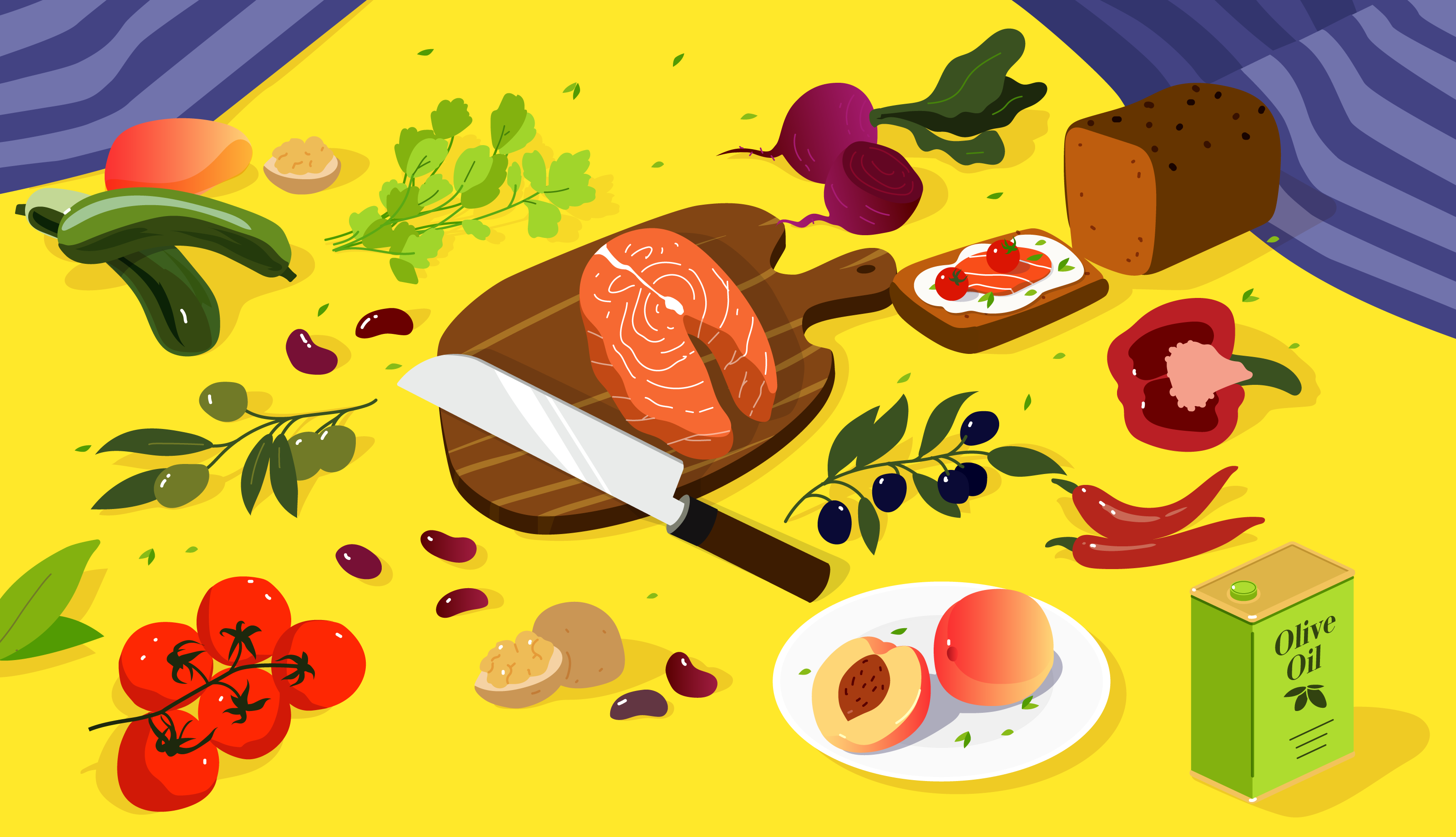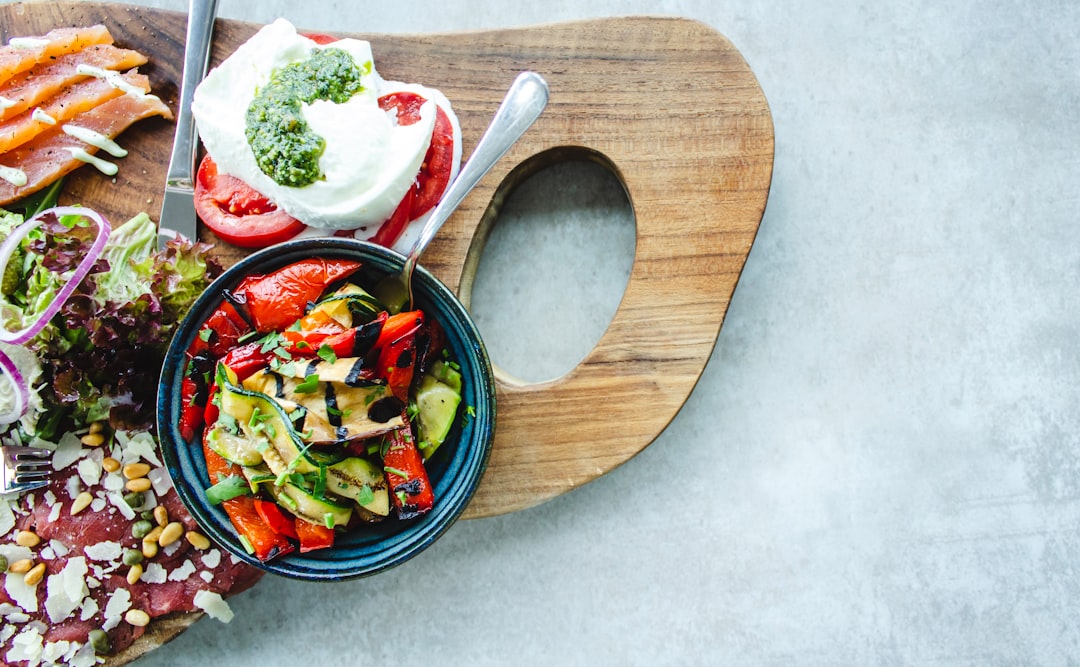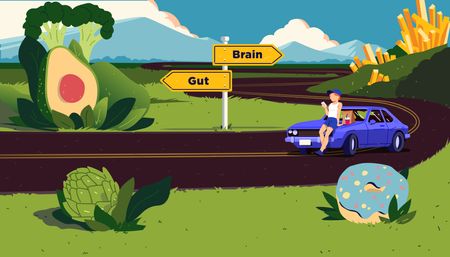Learn what makes the Mediterranean diet so unique, what to eat and how to make the right food choices without a PhD in nutritional biochemistry.
It’s not a stretch of the imagination to see why a diet composed of vegetables and fruit, healthy fats and moderate levels of protein, preferably from beans and fish, could be good for the human body and the gut microbiome. In fact, it’s one of the few things the medical research community can agree on.
But it does have to contend with the Western Diet, developed to please the palate and trick the brain with soft textures, high levels of fat, refined sugars and animal protein. Researchers now call it the SAD diet, as in Standard American Diet.
Photo by Louis Hansel / Unsplash
And so, in spite of our instinctual knowledge of what’s good and bad to eat, we trip up time and time again. Sometimes at every meal, on good days, maybe just once. The fact of the matter is simple: change is hard.
In fact, changing eating habits has proved so hard that it has doctors and researchers flummoxed as we, patients, get sicker, bigger and more unhappy. But knowledge is power, as Sir Francis Bacon once wrote.
And that’s why we’re going to explain how eating well like a bushy-browed grandfather from Italy can help with your digestive health, prevent and treat chronic diseases, and even improve your mental health.
☝️DISCLAIMER☝️ Always consult a GP before changing your diet, especially if you have a medical condition. Only registered healthcare professionals are qualified to guide patients when making dietary modifications for health.
What is a Mediterranean diet?
People from Greece, Italy, Spain and a myriad of other countries around this land bound sea are healthier, live longer and don’t suffer from high rates of chronic diseases like we do in countries on the SAD diet.
So it was only a matter of time before researchers sunk their teeth into this phenomenon. The Mediterranean diet stems from a frugal way of life steeped in tradition.
Even now along this coastline, people cook their meals from scratch using produce straight from the garden or bought at the local market. Their dishes contain all manner of fresh catch from the sea brought in by weatherbeaten fishermen on quaint, peeling boats.
There is little more quintessentially Mediterranean than the market with its loud voices and fierce haggling over bright bushels of parsley, fingers poking fish to check for freshness and wafting smells from street vendors.
Life is seasonal. For much of the year, evenings can be spent on long meals in the company of family and friends, feasting on bright, crisp, fresh vegetables and legumes brought to life by olive oil, herbs, fish, nuts, seeds and, often, a glass of red wine.
Unprocessed carbohydrates rein supreme around the Mediterranean. Rural living, historical poverty and necessary frugality have created a rich vegetarian diet with a smattering of fish and seafood. Meat and poultry were rare treats, because eggs and milk were sustainable - killing the beast was not.
Diversity, seasonality and simplicity created a style of cooking, like la cucina povera in Italy, that is emulated by legendary chefs. They actively seek out instruction from Nonna and Yaya, the famed Italian and Greek grandmothers.
Rulers of the kitchen and guardians of local culture, the Nonnas and Yayas of the world have spent decades honing their ability to eke out flavour from the most miserly of vegetables.
Beans and lentils grow well in such climes, and made for a staple adorning tables from Morocco to Malaga. Here, lemons feature heavily, well before science uncovered that vitamin C is essential in making the iron content of legumes available for use by the human body. You see, instinctive knowledge.
Photo by Juan Gomez / Unsplash
The climate is ideal for grains like wheat that prefer dry, sunny days. These are ground and milled into a myriad of textures to make favourites around the world. Hard durum wheat is turned into couscous and semolina, or milled to its finest and combined with softer wheat to make “00” flour for pasta and bread.
Goats, sheep and cows suited to dry, hot climates graze on the foothills and steep slopes of mountains, producing milk that’s turned into a smorgasbord of mostly unpasteurised, local cheeses. Ranging from mild to rich and fragrant, they adorn sweet and savoury dishes.
But cheese is not the only fermentation performed by Mediterranean cultures. Grapes are turned into wine and olives are soaked in a salty brine. In Turkey, milk is turned into ayran, a probiotic beverage to which long life expectancy has been attributed. The excess of garden produce is pickled or sundried while vinegars ferment slowly from alcohol.
And herein lies the crux of the Mediterranean diet: it is not just a prescriptive list of food, it is a way of life that provides health by catering to our most basic human needs: good company and good food.
The Mediterranean diet plan
When scientists sink their teeth into something, debate naturally arises. Mathematical fervour lends to reductionism, by which quantities must be exact, frequency of consumption is the law and failure to comply leads to failure of the study. Could there be anything less Mediterranean?
Indeed, presumably to the frustration of researchers, every culture, country, region, town, village and family has its own take on the Mediterranean diet depending on what's available in the garden, from farmers and fishermen.
And this means something very simple and very relevant for us, as followers or curious bystanders: there is no perfect consensus on what constitutes the ideal Mediterranean diet. Nevertheless, there are relatively specific guidelines on what to eat, and at what frequency.
The Mediterranean way of life is flexible and easy-going, which is why this list contains recommendations of what you should eat and how often. It’s not a prescription, but a good list to print and put on your fridge - as a reminder when you sit down to make up your weekly shopping list.
How to choose the right foods
Remember to choose whole foods, not highly-processed interpretations - that is where you could inadvertently cross the line, no longer eating a Mediterranean diet, but a SAD Westernised approximation with food-like substances, additives, fillers and high levels of refined sugars and salt.
For example, canned baked beans are not a Mediterranean food, but plain beans in a can are okay. Frozen vegetables are a suitable option if you are pressed for time, but processed frozen vegetables in sauces are not.
Stay away from supermarket pasta because it’s high in refined sugars, consuming only in moderation and preferring legumes. Tomato sauce from a jar doesn’t count, but canned tomatoes heated, blended and seasoned in a pot are fine.
Learn more about the Mediterranean diet, olive and gut-brain axis in this podcast with Miguel Toribio-Mateas
In the same way, jam does not count as fruit, nor does a fruit filling in a biscuit, or a fruit-flavoured yoghurt - no matter what it says on the packet. Nuts should be raw, not fried and salted.
Breads and cereals are high on the list of foods to consume. That doesn’t mean you can eat them without consequences. Stay away from white bread, and check the label. If it contains anything but flour, water, yeast and salt - then it’s not bread, it’s an industrial interpretation of bread. And by cereals, they do not mean breakfast cereals, they mean whole grains like porridge, wheat berries, even buckwheat kasha.
As for fish and seafood, bear in mind that larger fish are higher up on the food chain, and therefore tend to have higher concentrations of mercury in their flesh. Mercury is not good for human health, especially pregnant women. Chemicals are often used to preserve cheap seafood while it sits on boats in exotic waters, waiting to return to shore for processing.
So, unless you live by the sea and know a fisherman, these are important considerations related to the nature of industrial food distribution that, over the long-term, are probably not advisable.
And finally, invest in good quality extra virgin olive oil from a single country. One better, olive oil from a single producer in one country. Along with honey, it is one of the most adulterated products on the supermarket shelves. And why extra-virgin you wonder? This refers to how it is produced: it is cold-pressed using techniques that preserve the most benefits for your health.
List of food for Mediterranean diet
It’s important to remember that it is not a diet Mediterranean menu, because diets imply restriction. The Mediterranean diet is a food culture in which whole plant foods, combined with moderate consumption of eggs, fish and dairy provide the body with an array of nutrients and phytochemicals that promote health.
In addition to this, eating meals rich in fibre and olive oil satiates the appetite faster, leaving you feeling fuller, and fibre creates a matrix that reduces the calories absorbed in the gut.
What to eat on the Mediterranean diet
| Food | How often |
| Olive oil | Every meal |
| Vegetables | Every meal, 2–6 servings daily |
| Fruit | Every meal, 1–6 servings daily |
| Bread & cereals | Every meal |
| Legumes | From 2–4 servings weekly to every meal |
| Nuts | From 2–4 servings weekly to every meal |
| Fish & seafood | 2–6 servings weekly |
| Eggs | 2–4 servings weekly |
| Poultry | 2–4 servings weekly |
| Dairy | 2 servings daily |
| Red meat | 1 serving weekly |
| Sweets | 3 servings weekly |
| Red wine | In moderation |
The gut microbiome and the Mediterranean diet
Studies show that following a Mediterranean-style diet can increase levels of short-chain fatty acids that support gut health, fuelling cells in the digestive tract, promoting the integrity of the gut lining and performing essential roles in reducing inflammation.
In fact, recent research in humans has indicated that supplementing the diet with omega-3 polyunsaturated fatty acids can increase levels of probiotic microbes Lactobacillus and Bifidobacterium and others short-chain fatty acids producers, Lachnospira and Roseburia.
Omega-3s are important for brain and heart health. They are also a natural and integral part of a well-balanced Mediterranean diet, present in fatty, sustainable fish like herring and mackerel, as well as in nuts.
High levels of plants and their dietary fibres act as prebiotics (food for gut microbes) that support the presence of beneficial bacteria. Monounsaturated fatty acids, like olive oil, have also been shown to increase levels of Akkermansia muciniphila, a microbe found in lean people.
Briefly put, the Mediterranean diet doesn’t just nourish the body, it contributes to the diversity and stability of health-promoting communities of gut microbes that are essential for your health.
The action of a balanced gut ecosystem helps reduce inflammation and has been shown to protect against chronic diseases like diabetes type 2, cardiovascular disease, obesity as well as autoimmune diseases, like Crohn’s and ulcerative colitis.
Diseases and the Mediterranean diet
The Mediterranean diet can help prevent many common, chronic and deadly diseases found in Westernised cultures.
| Premature death | People following this diet are less likely to die prematurely |
| Heart disease | Helps prevent stroke and heart attack |
| Diabetes type 2 | Helps stabilise blood glucose and reduce insulin resistance |
| Health ageing | Prevents cell damage by inflammation, promotes longevity |
| Brain health | Linked to better cognitive function, slower cognitive decline |
| Cancer | Helps reduce risk of some common cancers, like bowel cancer |
| Depression | May help prevent depression - ongoing research in this area |
Take control of your health
In law and politics, there are mechanisms to encourage positive behaviour. But when it comes to health, every individual is liable for his or her own transgressions - much to the despair of medical professionals.
Indeed, as you probably already know, it is surprisingly hard to change your eating habits. Confronted at each street corner with smells designed to titillate the senses and bombarded by advertising and attractive packaging, the world outside your home is a minefield of temptations.
And let’s not forget, the intricacies of our personal lives - with loved ones and flatmates who may be less on board with eating vegetables. Not to mention the time-consuming act of food preparation. And these are just some of the hurdles on your journey to health, wellbeing and peace of mind.
But a little knowledge and incentive from scientific findings can go a long way in helping you feel better and preventing chronic diseases that are far too common in modern-day life.
The Mediterranean diet is a flexible and flavoursome alternative to off-the-shelf foods. But it’s also an invitation to connect over a meal, a chopping board and, when the weather permits, outside on a balmy summer afternoon in Northern Europe.
- C Davis et al, Definition of the Mediterranean Diet: A Literature Review, 2015
- Harvard School of Public Health, Diet Review: Mediterranean Diet
- Andreu Prados, An update of the scientific evidence behind the microbiota-specific effects of common dietary patterns, 2019
- H Watson et al., A randomised trial of the effect of omega-3 polyunsaturated fatty acid supplements on the human intestinal microbiota, 2017
- RL Singh et al., Influence of diet on the gut microbiome and implications for human health, 2016
- R Schwingshackl et al., Adherence to Mediterranean Diet and Risk of Cancer: An Updated Systematic Review and Meta-Analysis, 2017
- T Psaltopoulou et al., Mediterranean diet, stroke, cognitive impairment, and depression: A meta‐analysis, 2013
- S Dash, The gut microbiome and diet in psychiatry: focus on depression
,2015




















